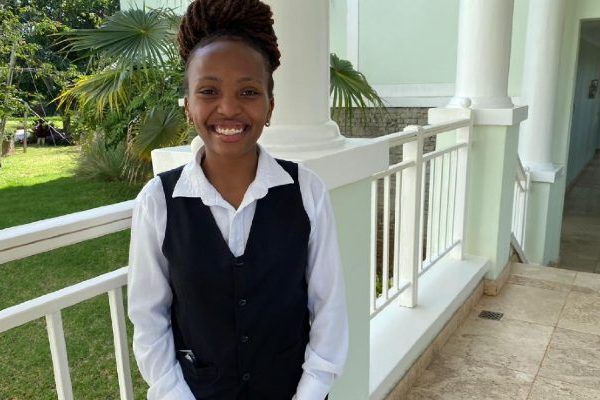Experiencing Dutch directness in a volatile industry where guests expect to be pampered was a marvel for the Strathmore Masters in Hospitality Business Management students.
The long-awaited professional visit took place during the autumn season in the Netherlands, at a time when the weather felt like home, sunny, bright, but chilly. The commute to the hotel in Deventer proved to be a considerable wait for the students, following an 18-hour connecting flight through Dubai.
As part of the international module, Monday took a nose dive right into the physical lessons on change and innovation and global marketing, both of which were conducted at the Saxion University Apeldoorn campus. Their motto is “Get Ready for a Smart World”, and what a way to hammer innovation! The lessons underscored the fundamental relationship between change, innovation, and global marketing in the rapidly evolving landscape of the hospitality sector. Timing plays a pivotal role in effectively implementing change, especially considering the global market. Innovation in services, amenities, and customer experiences is essential to stay competitive in the global hospitality industry, driven by technological advancements and evolving consumer preferences. To ensure the success of these innovations, businesses ought to embrace global marketing strategies. These strategies not only facilitate businesses to reach diverse international markets, and adapt their offerings to meet varying cultural preferences, but also establish a strong global brand presence. Therefore, a strategic balance between innovation and the timely implementation of change is crucial for hospitality businesses aiming to thrive in an ever-changing industry. Too early, and the market might not be ready; too late, and the opportunity might have passed.
The lessons were coupled with industrial visits to diverse hotels in Amsterdam and Apeldoorn, aimed to put the context into perspective. Not forgetting, a little fun and play was factored in. The students experienced effective train commutes, cycling, walking, and daily servings of Dutch treats. They enjoyed scrumptious cold sandwiches for lunch with the faculty.
Well, jumping right in, what is change and innovation in hospitality? Notwithstanding the typical class definition, the Dutch have found an interesting way of reusing and repurposing their old buildings to foster and enhance their sustainability practices. Case in point and a physical tour to WeAreBunk Amsterdam, a 3-star hotel repurposed from an old Roman-Catholic church, St. Rita, that was built in the 20th Century. To commemorate the church’s history, the 300-room hotel erected an open-air monument and rebuilt the library that is used by their young, energetic guests travelling from all corners of the world. The hotel has built 100 rooms on each floor, a restaurant, a library, and a co-working space using quirky signage labels, all sheltered within the old church walls. Their hospitality trend – is hybrid hospitality, where guests co-create their adventure and individuality. So, instead of knocking down those old buildings, think, innovate, and change.
Tour number 2 shifted us back in time, to when luxury hospitality encompassed five doormen and a red carpet. Welcome to the 5-star Anantara Grand Hotel Krasnapolsky, located in the heart of Amsterdam. Housing 402 guest rooms and suites, a Michelin-star awarded restaurant, a wellness center and conferencing facilities (critically note that the hall has no pillars in the middle), the hotel has hosted royal celebrations and world conventions and welcomed distinguished travellers for over 150 years. Part of the success of the hotel, besides providing exquisite service to its guests, is its prime location at the center of Dam Square, right across from the Royal Palace. It is notably important to remember that the hotel has been standing for over 150 years and to maintain its glamour, renovations have gradually been effected in some of their rooms and the grand reception area.
Last but definitely not least, the students were introduced to a Dutch hospitality brand, The Bilderberg, with a cycling tour to their recently renovated facility, Hotel De Keizerskroon in Apeldoorn. The hotel is located right next to the Royal Paleis Het Loo. and has been in the personal possession of Queen Wilhelmina since the 1960s. Interestingly enough, their best suites are named after the royal family members, and boy do the rooms match the intimate glam! Their newly renovated reception area and rooms with a touch of modern, minimalist design are uniquely spacious and all have a balcony, with some overlooking the Royal Gardens. On the 4th floor of the hotel, you can enjoy the swimming pool, sauna, and gym.
After an exhaustive week of intense studying and engaging in physically demanding industrial visits, the students eagerly embraced the prospect of a well-deserved shopping spree in central Apeldoorn. The anticipation bubbled within them as they navigated the bustling shops; their tiredness was gradually replaced by excitement. With each new store they explored, their faces lit up with joy as they picked out souvenirs and items they could bring back home. It wasn’t just a shopping spree; it was a celebration of their hard work after days of rigorous academic pursuits.
As the day drew to a close, the students concluded their European visit with a heartwarming breakfast with their dean, with nostalgia, and with their bags brimming with newfound treasures and brains full of ideas and adventure. The thought of reuniting with their families added an extra layer of happiness, infusing the day with a sense of fulfillment and anticipation for the warm embraces waiting for them at home.
Written by Lilo Mwangi
What’s your story? We’d like to hear it. Contact us via communications@strathmore.edu




